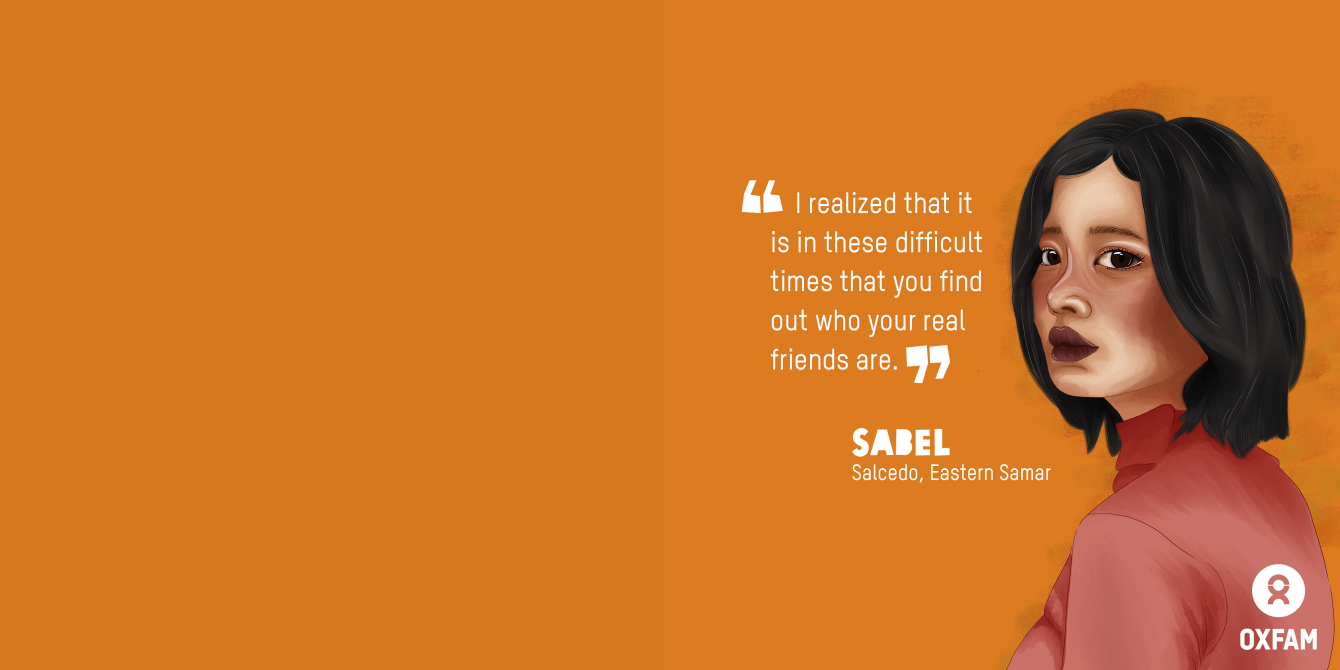
Sabel, HBCC Stigma Stories (Illustration: Vina Salazar/Oxfam)
Stigma Stories: A Sisters' Reunion
For Sabel, it was like a scene from a movie. It was around 11:00 in the evening when a police car rushed through their quiet street, waking up the neighbourhood. Suddenly, the police came down from the vehicle and rushed to their house to collect her sisters. “We felt like criminals,” she shared, looking back to that night.
A few months ago, Sabel’s sister, Lina, came back home after working for a long time overseas. Following the Government’s health protocols, Lina went through a COVID-19 swab test in Tacloban City but immediately went straight to her sisters’ house in Barangay Maslog, in Lawaan, Eastern Samar.
Three days after, Sabel and her sisters received the news that Lina tested positive for COVID-19. The message came from the hospital that communicated with the local government of Lawaan. A 72-hour hard lockdown was imposed on the community. No one was allowed to go in and out of the town. Fear and sadness loomed over Sabel and her family. How did a happy reunion suddenly turn into a nightmare?
That day, they told Sabel that her sisters will be picked up in the evening and will be isolated in the town’s isolation facility. At that time, there were few COVID-19 cases in the whole province, and Barangay Maslog was one that had an active case.
Sabel, 44, who served as a community leader and a Barangay Health Worker, knew that she had to enter into quarantine. She, too, had been in contact with Lina, but she stayed in a different house. She pleaded with the health unit to quarantine along with her family, as she was taking care of her four-month-old baby and her elderly mother. The health unit understood her situation.
While in quarantine, there was nothing that Sabel could do but rely on the food assistance and provisions from the local government unit. A few concerned neighbours reached out and comforted them by bringing food to their house, while her relatives were nowhere to be seen. Sabel felt abandoned.
“I realized that it is in these difficult times that you find out who your real friends are.”
On the fourth day of isolation, Sabel and her sisters received news that Lina tested negative on the second swab test. This relieved Sabel knowing that her sisters are now safe. But the health unit ordered, her and her sisters, to remain in isolation for ten more days to complete the mandatory 14-day quarantine. Her mind was exhausted with worrying and she yearned to unwind, breathe some fresh air, and tend to her vegetable garden.
“I kept praying to God and it made my faith stronger. We survived through the help of our friends and the generosity of the Barangay government.”
Her experience taught her that taking care of one’s mental health is crucial, especially now in the time of the pandemic, and it needs to be seriously addressed by the Government. Helping COVID-19 survivors recover physically, mentally, and emotionally, must be a concern for all.
*Sabel and Lina’s real names withheld.
 Follow us on Facebook
Follow us on Facebook Instagram
Instagram Follow us on Twitter
Follow us on Twitter LinkedIn
LinkedIn